Potato and Carrot Mash
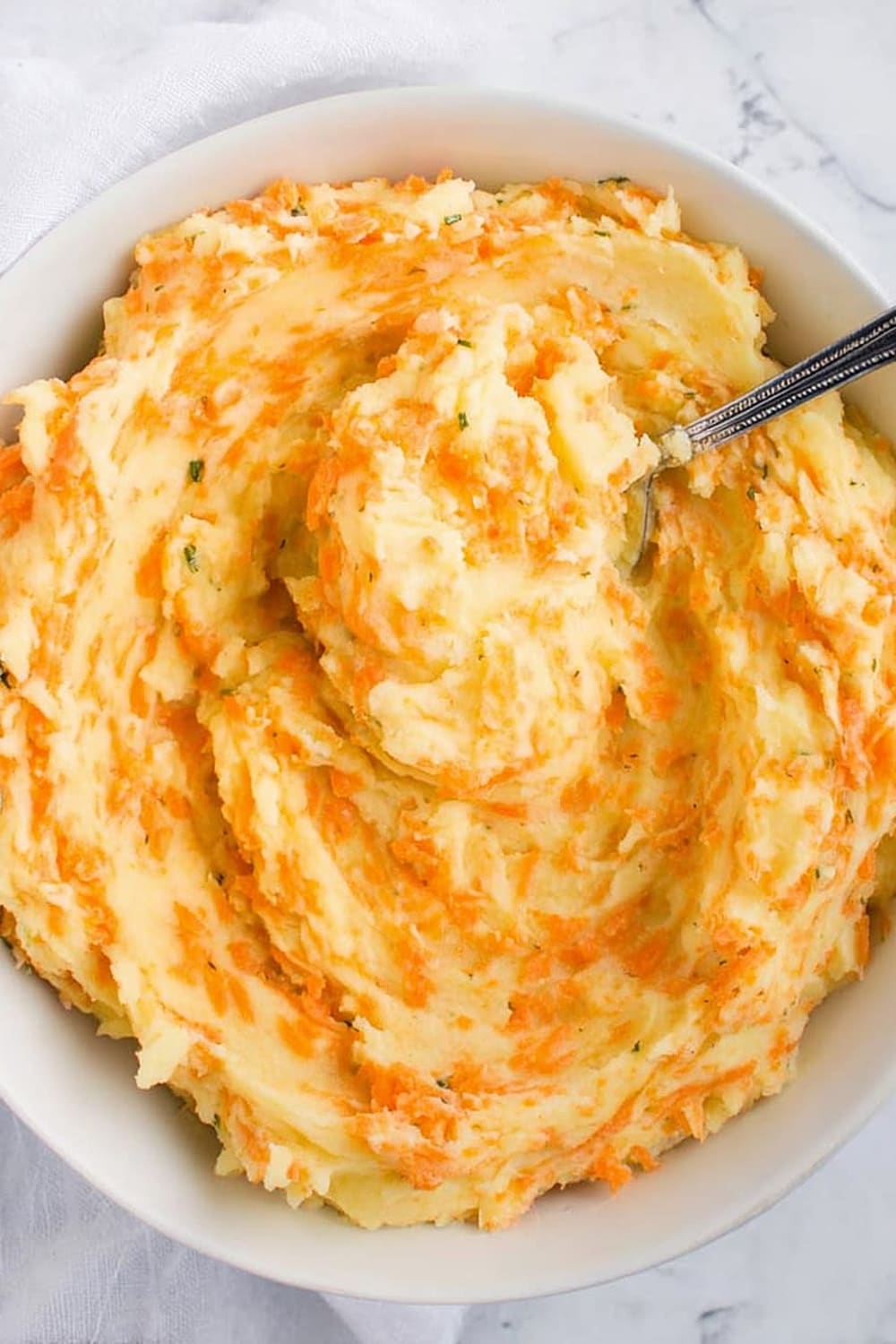
This creamy, colorful side dish is about to become your secret weapon for making any meal feel more special without breaking a sweat.
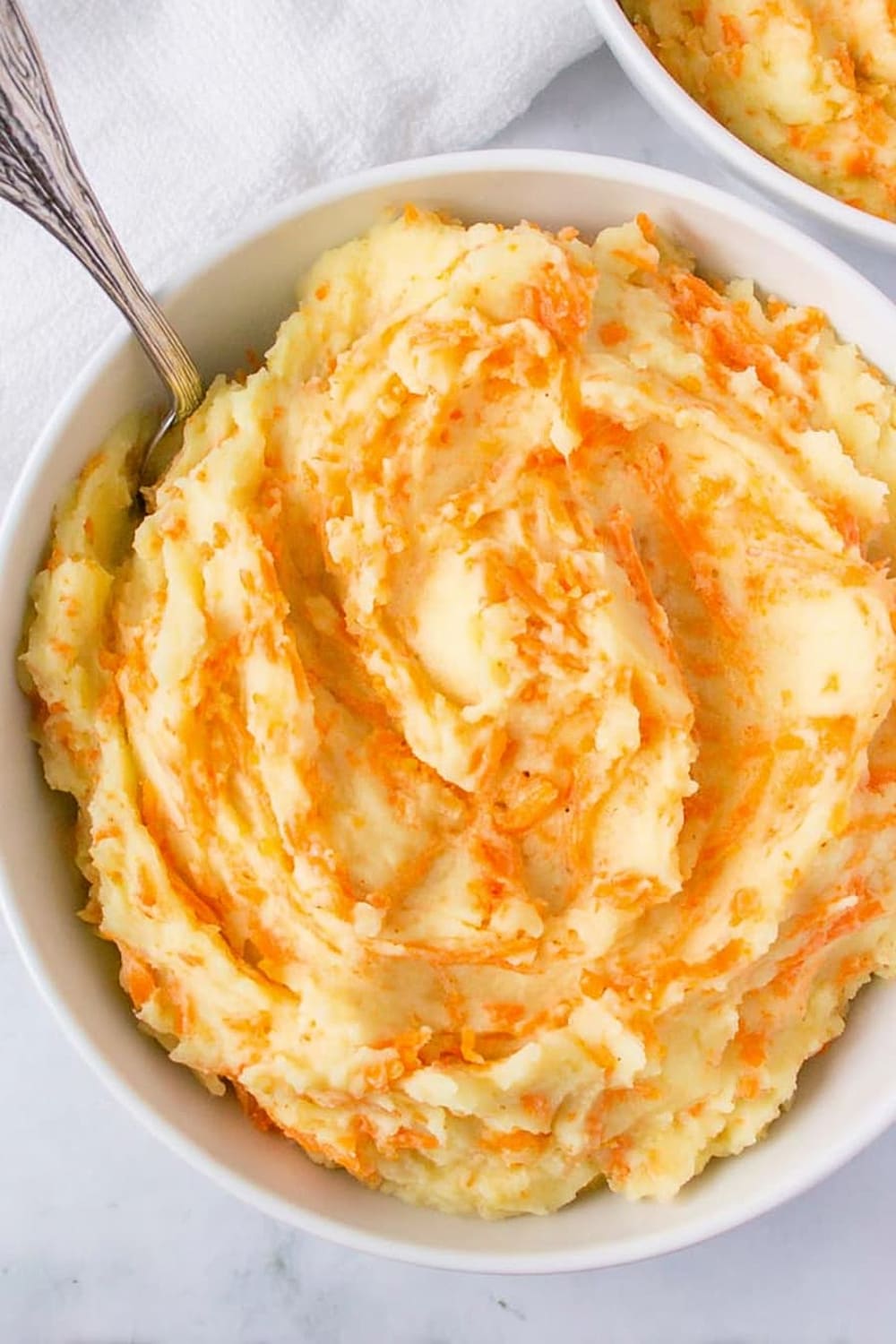
The natural sweetness of carrots paired with fluffy potatoes creates a vibrant orange mash that’s basically comfort food with a glow-up.
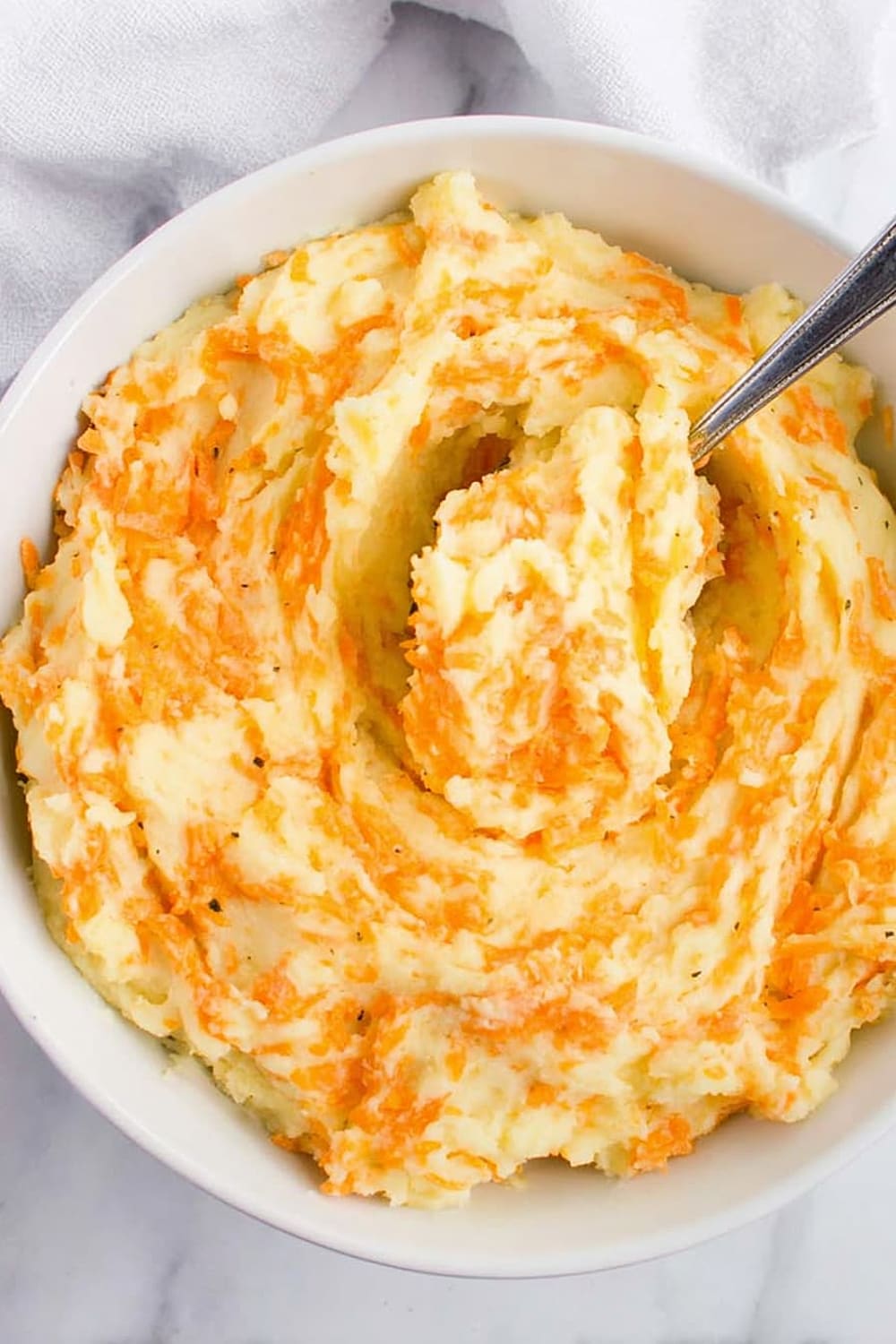
You’ll love how this simple combination transforms humble root vegetables into something that looks like you spent hours perfecting it (spoiler: you didn’t).
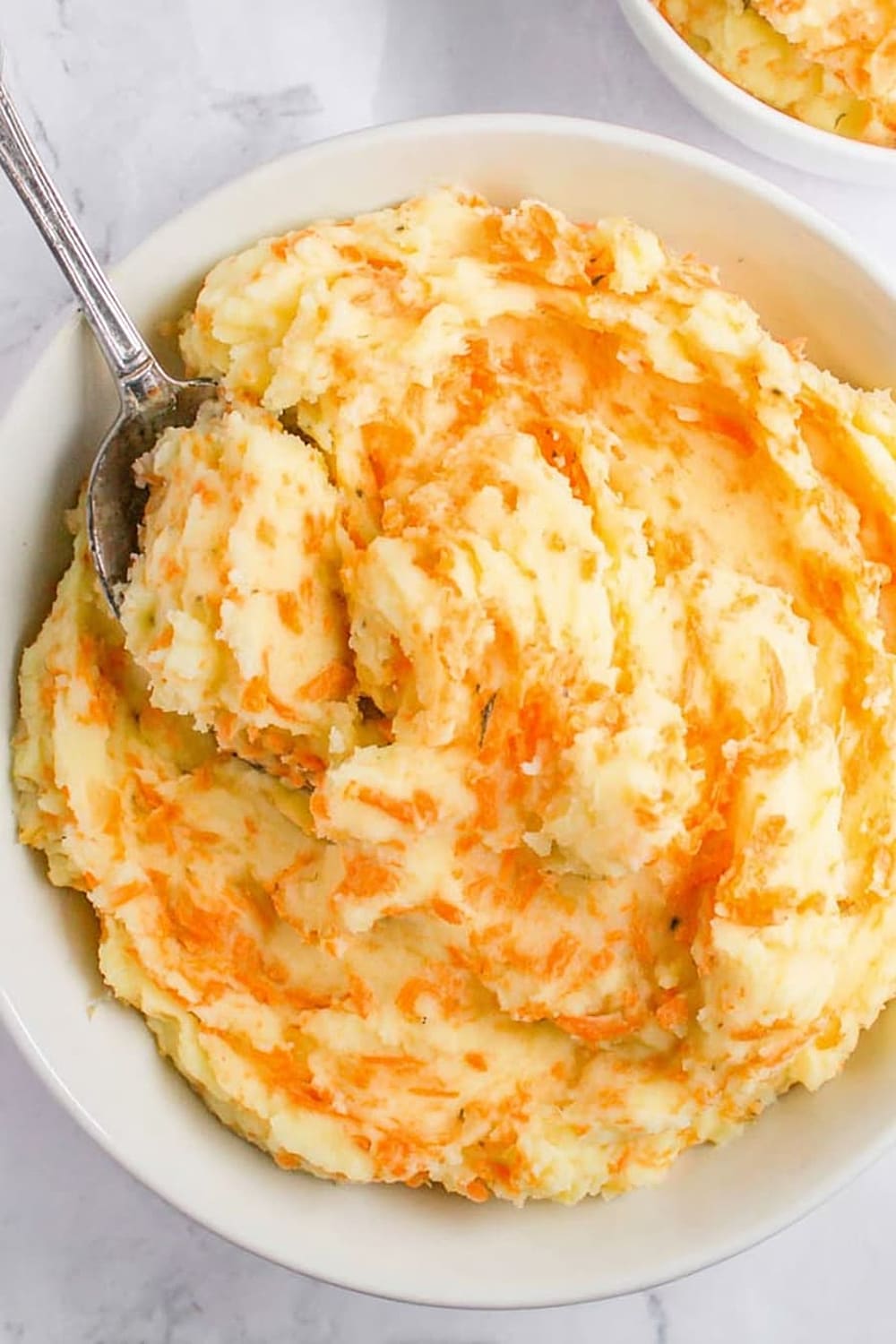
The best part is watching people try to figure out what makes your mash taste so much more interesting than regular potato mash.
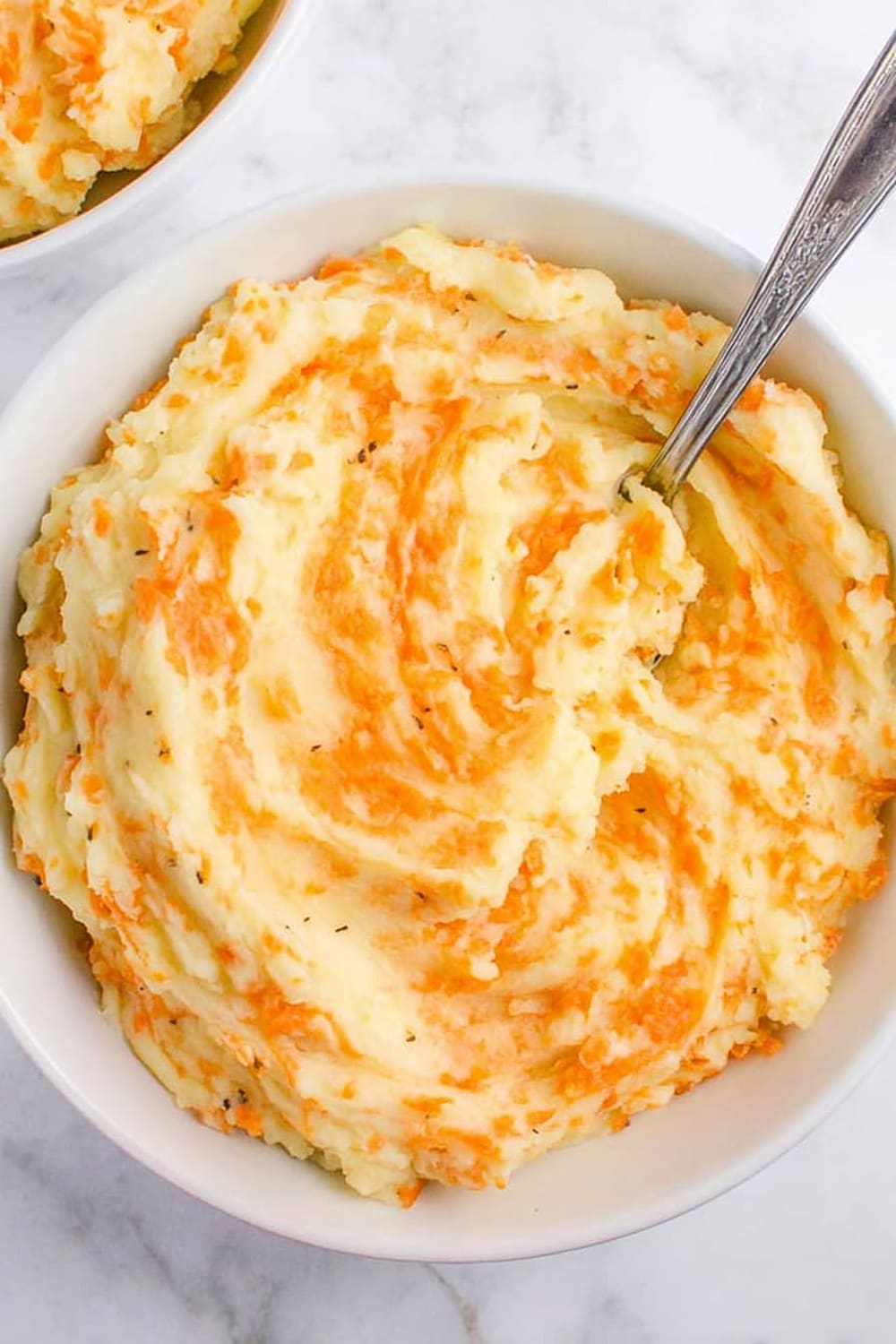
This recipe proves that sometimes the most impressive dishes come from the most straightforward techniques and everyday ingredients.
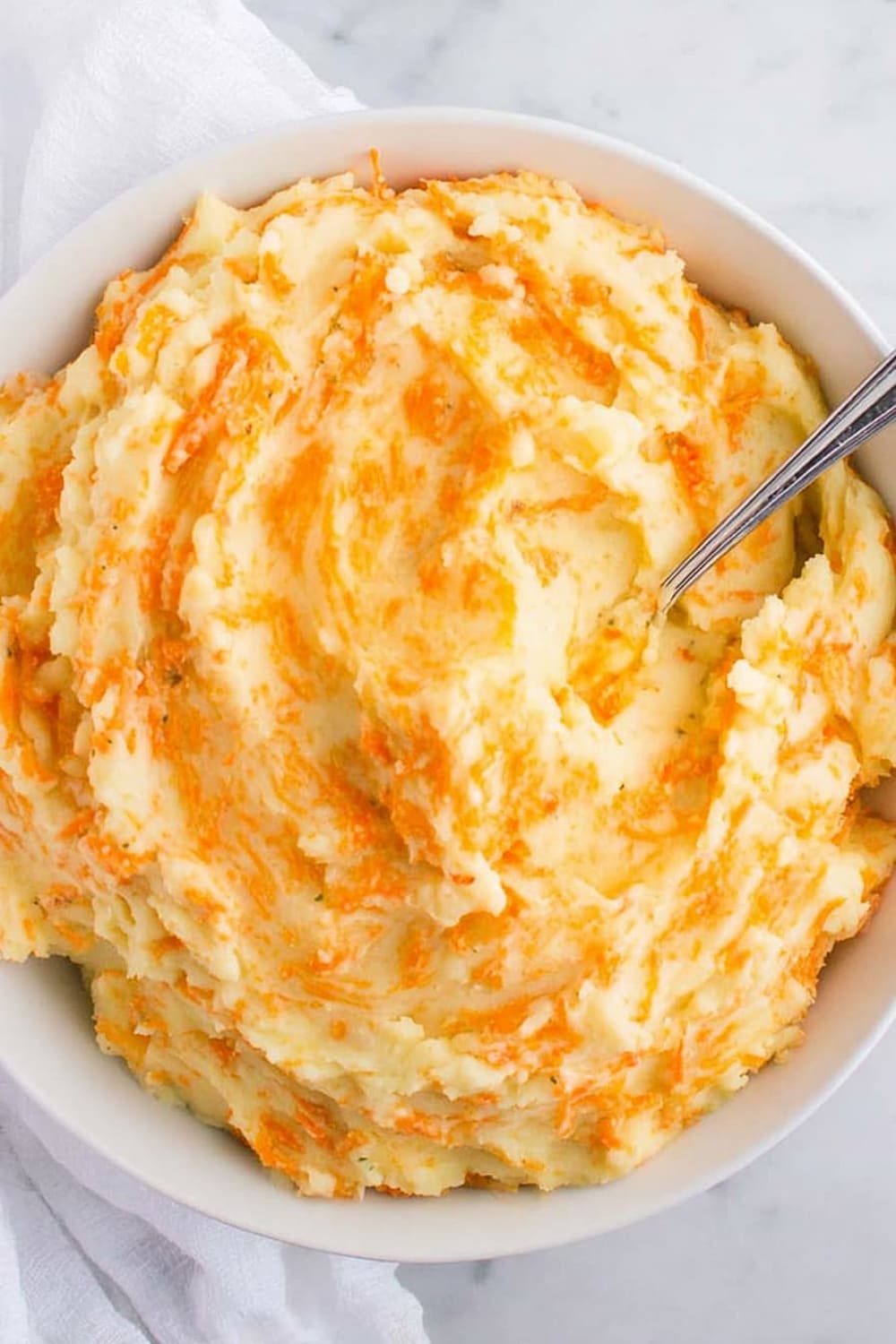
Get ready for compliments and recipe requests because this colorful twist on classic mash is about to become everyone’s new favorite side dish.
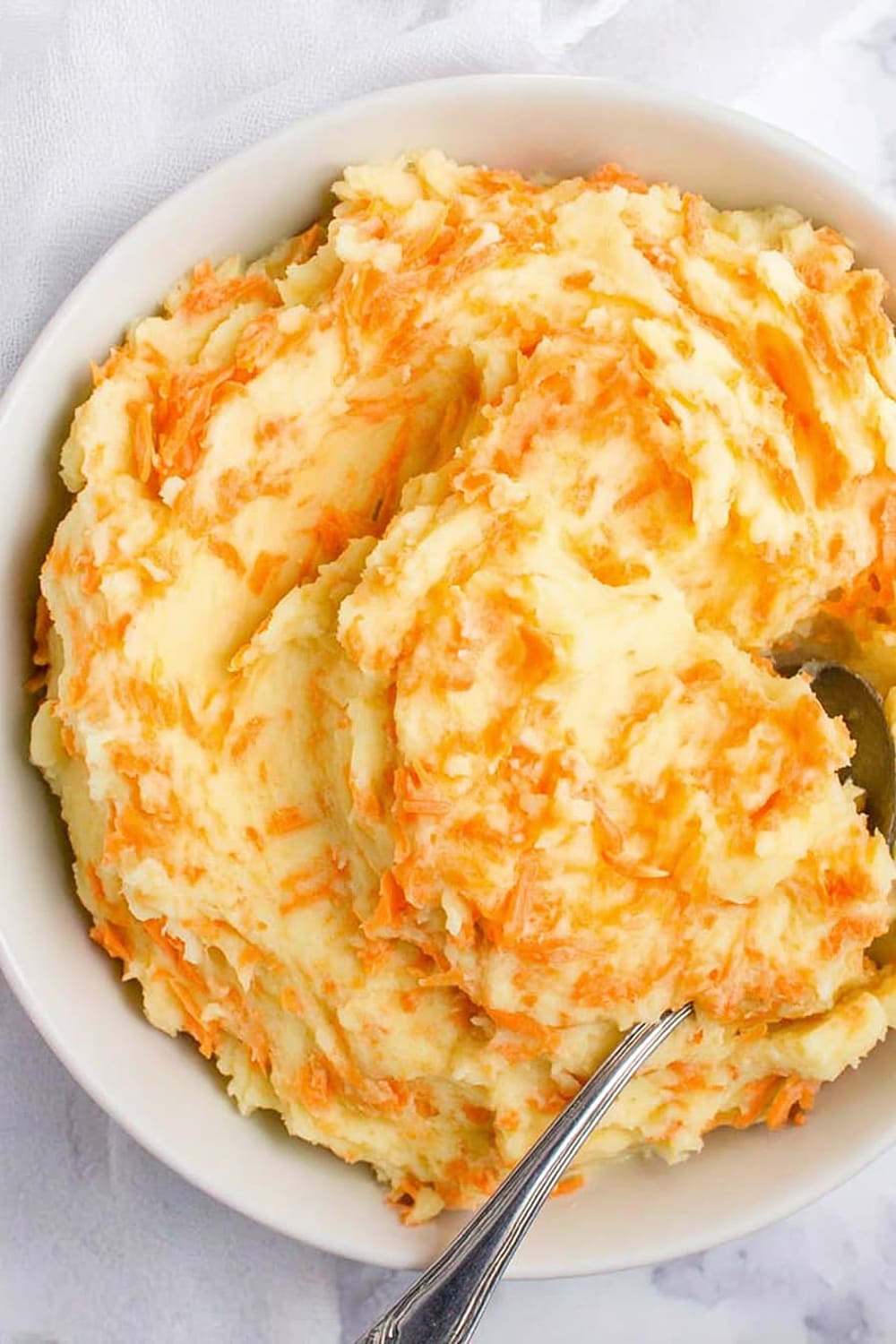
Ingredients
For the Mash
- 200 g (3 medium carrots) – peeled and cut into 1cm chunks
- 650 g (4 medium potatoes) – peeled and cut into rough chunks approximately 3-5cm cubed (choose starchy varieties like Russet or Yukon Gold)
- 60 ml (¼ cup) milk – whole milk preferred for creaminess
- 20 g (1 tablespoon) butter – unsalted, room temperature
- Salt and pepper – to taste
Instructions
Prepare the Vegetables
- 1 Place the carrot chunks and potato pieces in a large saucepan, ensuring they’re cut to similar sizes for even cooking. The 1cm carrot pieces and 3-5cm potato chunks will cook at roughly the same rate, preventing mushy carrots or undercooked potatoes.
- 2 Cover the vegetables completely with cold water, adding about 2 inches of water above the vegetables. Starting with cold water ensures even cooking throughout, and using a large saucepan prevents overcrowding which can lead to uneven results.
Cook the Vegetables
- 3 Bring the water to a rolling boil over high heat, then immediately reduce to medium-high and cover the pan. The vigorous bubbling should be visible around the edges, indicating the proper temperature for consistent cooking.
- 4 Simmer the covered vegetables for 18-22 minutes until very tender when pierced with a fork. Test both carrots and potatoes – they should offer no resistance when pierced, and the fork should slide through easily. Undercooked vegetables will result in lumpy, unpleasant mash.
Prepare the Dairy Mixture
- 5 While vegetables are cooking, combine the 1 tablespoon butter and ¼ cup milk in a small saucepan over low heat. Warm gently until the butter melts completely and the mixture is steaming but not boiling, about 3-4 minutes. This warming step prevents the mash from cooling down when you add the dairy.
Create the Mash
- 6 Drain the cooked vegetables thoroughly in a colander, shaking gently to remove excess water. Return them immediately to the warm cooking pan – the residual heat will help evaporate any remaining moisture that could make your mash watery.
- 7 Add the warm butter-milk mixture to the vegetables and begin mashing with a potato masher or large fork. Work systematically across the pan, pressing down firmly and twisting slightly with each mash. The potatoes will break down smoothly, while the carrots will retain some texture and create beautiful orange streaks throughout.
- 8 Season generously with salt and freshly ground black pepper to taste, starting with ½ teaspoon salt and adjusting as needed. The vegetables will absorb seasoning readily while still warm.
Recommended Equipment and Kitchen Tools
Essential Tools (for best results)
- Large saucepan – A heavy-bottomed pan distributes heat evenly and prevents sticking during the cooking process
- Potato masher – Creates the perfect texture balance, allowing carrots to remain slightly chunky while potatoes become smooth
- Small saucepan – For gently warming the milk and butter mixture without scorching
- Fine-mesh colander – Ensures thorough draining to prevent watery mash
Helpful Upgrades
- Kitchen scale – Provides precise measurements for consistent results every time, especially important for the potato-to-carrot ratio
- Instant-read thermometer – Test doneness by checking that vegetables reach 200°F (93°C) internal temperature
- Silicone spatula – Perfect for scraping every bit of the butter-milk mixture from the small saucepan
Nice-to-Have Options
- Food processor – If you prefer completely smooth carrot pieces, pulse carrots separately before adding to mashed potatoes
- Immersion blender – Can create an ultra-smooth texture, though traditional mashing is recommended for best results
- Warming tray – Keeps the finished mash at perfect serving temperature during meal preparation
Recipe Variations and Dietary Modifications
Dairy-Free Modifications
- Replace butter with vegan butter or extra virgin olive oil in equal amounts
- Substitute milk with unsweetened oat milk, cashew milk, or vegetable broth for richness
- Add 1 tablespoon nutritional yeast for extra savory depth
Vegan Version
- Use 2 tablespoons olive oil instead of butter for richness
- Replace milk with ¼ cup vegetable broth or plant-based milk
- Season with garlic powder and fresh herbs for enhanced flavor complexity
Low-Carb Adaptation
- Replace half the potatoes with cauliflower florets (cook together with remaining vegetables)
- Use heavy cream instead of milk for richness without added carbs
- Add cream cheese (2 tablespoons) for extra creaminess and lower carb content
Flavor Variations
- Herb-infused: Add 2 tablespoons fresh thyme or chives during final mashing
- Garlic lover’s: Roast 4 cloves garlic with vegetables for deeper flavor
- Spiced version: Include ½ teaspoon ground cumin and ¼ teaspoon paprika
- Cheese enhanced: Fold in ¼ cup grated Parmesan while mash is still hot
Texture Modifications
- Ultra-smooth: Process carrots separately in food processor before combining
- Chunky style: Mash less vigorously, leaving visible carrot and potato pieces
- Whipped version: Use hand mixer on low speed for 30 seconds after mashing
Nutritional Information and Health Benefits
Key Nutritional Highlights
This colorful mash provides approximately 165 calories per serving with a balanced mix of complex carbohydrates, essential vitamins, and minerals. Each serving contains roughly 35g carbohydrates, 4g protein, and 3g fat, making it a satisfying yet reasonable side dish option.
Health Benefits of Main Ingredients
Carrots are packed with beta-carotene, which converts to vitamin A in your body, supporting eye health and immune function. They also provide fiber for digestive health and potassium for heart function. The cooking process actually increases the bioavailability of beta-carotene, making this preparation method particularly nutritious.
Potatoes contribute significant vitamin C, potassium, and B vitamins, particularly B6 which supports brain function and metabolism. Despite their reputation, potatoes are naturally fat-free and provide resistant starch when cooled, which acts as a prebiotic for gut health.
Dietary Considerations
This recipe is naturally gluten-free, vegetarian, and contains minimal allergens (only dairy). The combination provides sustained energy from complex carbohydrates while the fiber content helps moderate blood sugar response. Each serving contains approximately 4g fiber and provides 20% daily value of vitamin A.
Smart Swaps and Ingredient Substitutions
Common Substitutions:
- Milk → Heavy cream (richer texture), vegetable broth (lighter version), or buttermilk (tangy flavor)
- Butter → Olive oil (1:1 ratio), coconut oil (¾ the amount), or cream cheese (2 tablespoons)
- Regular potatoes → Sweet potatoes (adjust cooking time to 15-18 minutes), Yukon Gold for creamier texture
Budget-Friendly Swaps:
- Fresh carrots → Frozen carrot chunks (thaw and drain first, reduce cooking time by 5 minutes)
- Whole milk → 2% milk plus 1 teaspoon butter for richness
- Butter → Margarine or vegetable oil spread in equal amounts
Pantry Emergency Substitutions:
- Fresh carrots → 1 cup canned carrots (drain well, add during last 5 minutes of potato cooking)
- Milk → Powdered milk reconstituted with warm water (2 tablespoons powder + ¼ cup water)
- Butter → 2 tablespoons olive oil or melted coconut oil
Pro Tips for Substitutions:
- When using oil instead of butter, add it gradually while mashing to prevent greasy texture
- Plant-based milks work best when warmed first to prevent curdling
- Store leftover substituted versions in refrigerator for up to 3 days, adding liquid when reheating
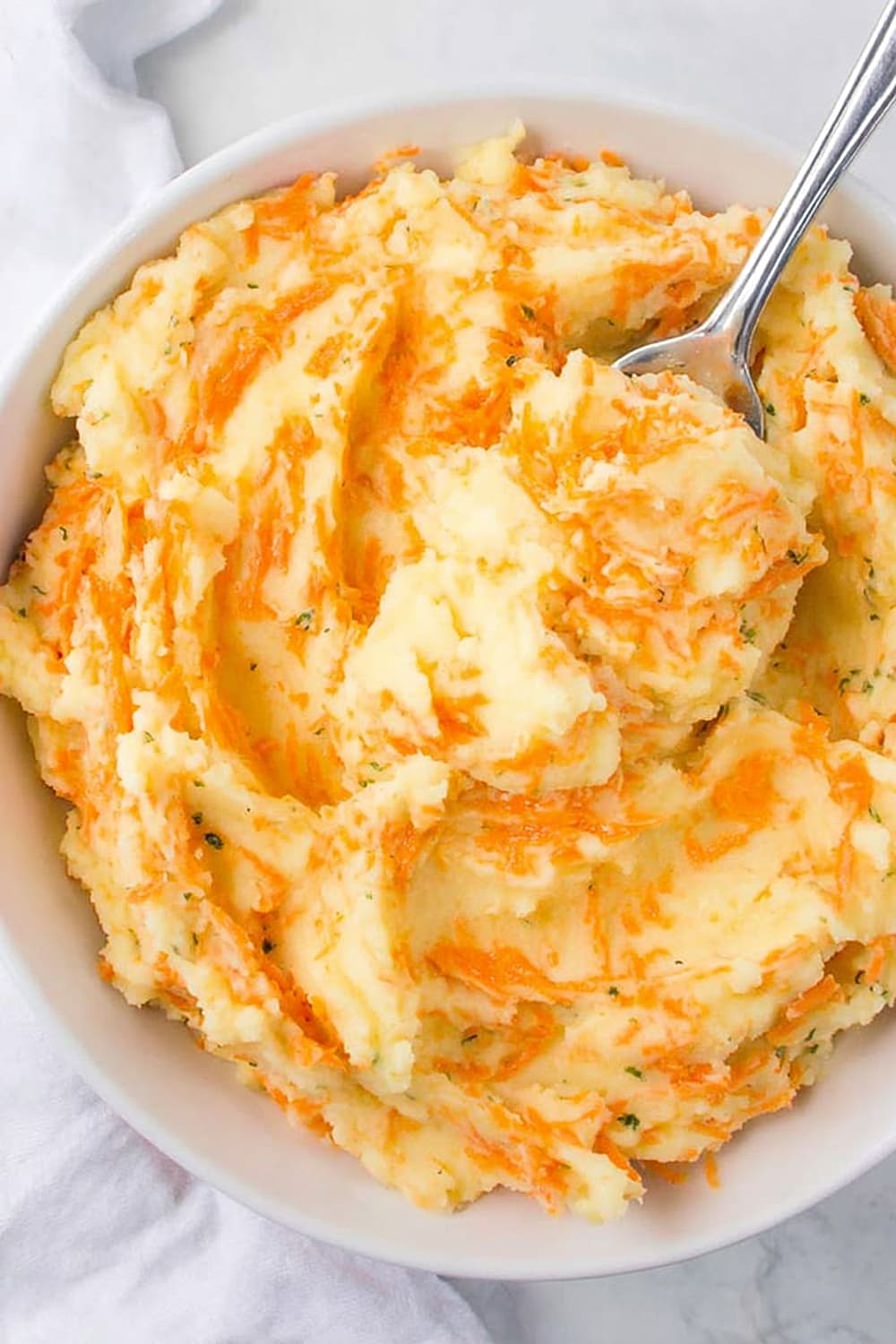
Make It Diabetes-Friendly
Carb Reduction Strategies:
- Replace half the potatoes with cauliflower florets to reduce carbs by approximately 15g per serving
- Use turnips or parsnips for 25% of potato content – maintains texture while lowering glycemic impact
- Add extra carrots instead of reducing vegetables entirely for maintained volume with better blood sugar response
Portion & Timing Tips:
- Serve ½ cup portions instead of ¾ cup to reduce carb content to approximately 22g per serving
- Pair with lean protein and healthy fats like grilled chicken with olive oil to slow glucose absorption
- Estimated carbs per standard serving: 35g; reduced version: 22g
Blood Sugar Management:
- Let mash cool slightly before eating – cooled potatoes form resistant starch which has less blood sugar impact
- Add 1 tablespoon ground flaxseed during mashing for extra fiber and omega-3 fatty acids
- Consider serving alongside high-fiber vegetables or leafy greens to further moderate glucose response
Total Carb Reduction: Modified version provides 37% fewer carbohydrates while maintaining satisfying portion sizes and familiar flavors.
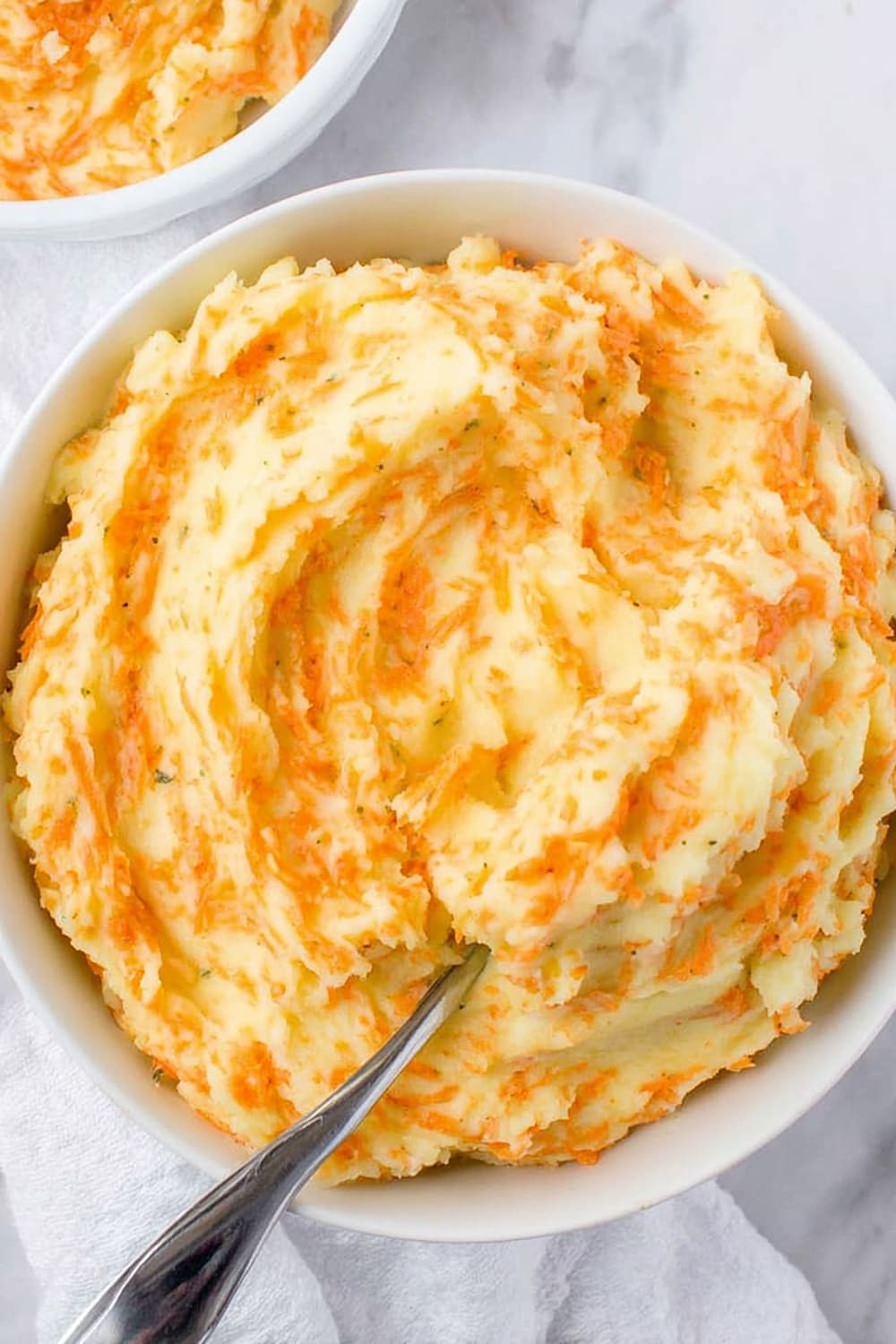
Perfect Pairing Suggestions
Beverage Pairings
This earthy, creamy mash pairs beautifully with medium-bodied red wines like Merlot or Côtes du Rhône, which complement the natural sweetness of carrots without overwhelming the delicate potato base. For white wine lovers, a buttery Chardonnay or crisp Sauvignon Blanc enhances the creamy texture. Non-alcoholic options include sparkling apple cider, herbal teas like chamomile, or even a rich vegetable broth as a warming beverage.
Side Dish Recommendations
The vibrant orange color and mild sweetness make this mash perfect alongside roasted Brussels sprouts with bacon, sautéed green beans with almonds, or a crisp arugula salad with lemon vinaigrette. The creamy texture contrasts beautifully with crunchy elements like toasted breadcrumbs on vegetables or caramelized onions with herbs.
Complete Meal Ideas
Build dinner around this mash with herb-roasted chicken thighs, pan-seared pork chops, or grilled salmon for protein. For vegetarian meals, pair with lentil loaf, stuffed portobello mushrooms, or roasted vegetable medley. The mash works as a base for shepherd’s pie or alongside braised short ribs for special occasions.
Occasion Suggestions
Perfect for family Sunday dinners, Thanksgiving sides, or casual weeknight meals when you want something special but achievable. The beautiful color makes it ideal for entertaining and holiday gatherings where presentation matters.
Pro Tips and Troubleshooting
Professional Techniques
Start vegetables in cold water rather than boiling water for even cooking throughout. The gradual temperature increase prevents the outside from overcooking while centers remain firm. Warm your dairy before adding – cold milk will cool down your mash and require reheating, which can make potatoes gluey.
Common Mistakes and Solutions
Watery mash happens when vegetables aren’t drained thoroughly – shake the colander vigorously and let vegetables sit for 2-3 minutes before returning to the pan. Lumpy texture occurs when vegetables are undercooked – they should fall apart easily when pierced. Gluey consistency results from overmixing potatoes – mash just until combined, then stop.
Storage and Reheating
Store covered in refrigerator for up to 4 days. Reheat gently in microwave with 1-2 tablespoons milk to restore creaminess, or warm in saucepan over low heat, stirring frequently. Freezing works for up to 3 months – thaw overnight and reheat with additional liquid.
Make-Ahead Strategy
Prepare completely up to 2 days ahead and refrigerate. Reheat in 350°F (175°C) oven for 20 minutes, covered, stirring halfway through. Add extra milk if needed to restore original consistency.
Recipe Scaling
Double easily using a larger pot and extending cooking time by 5-8 minutes. For half batches, use a smaller saucepan and reduce cooking time to 15-18 minutes. Maintain the 3:1 potato-to-carrot ratio for best flavor balance.
This vibrant potato and carrot mash proves that the simplest combinations often create the most memorable results, transforming everyday vegetables into a side dish that’s both comforting and visually stunning enough for any occasion.